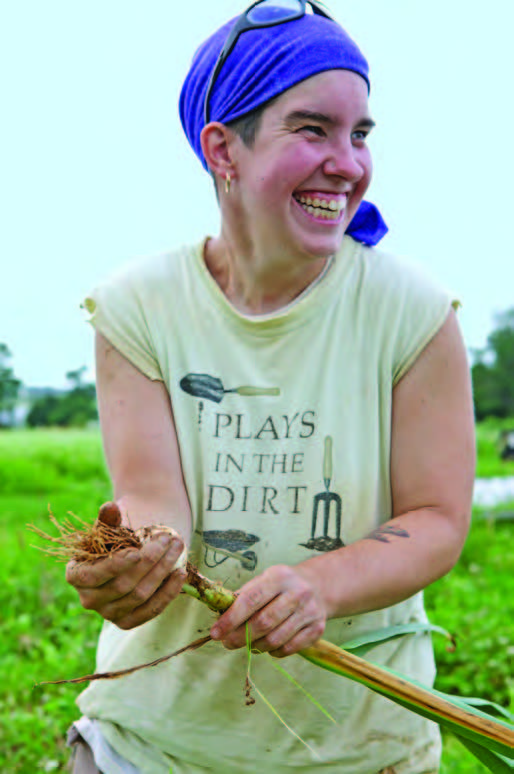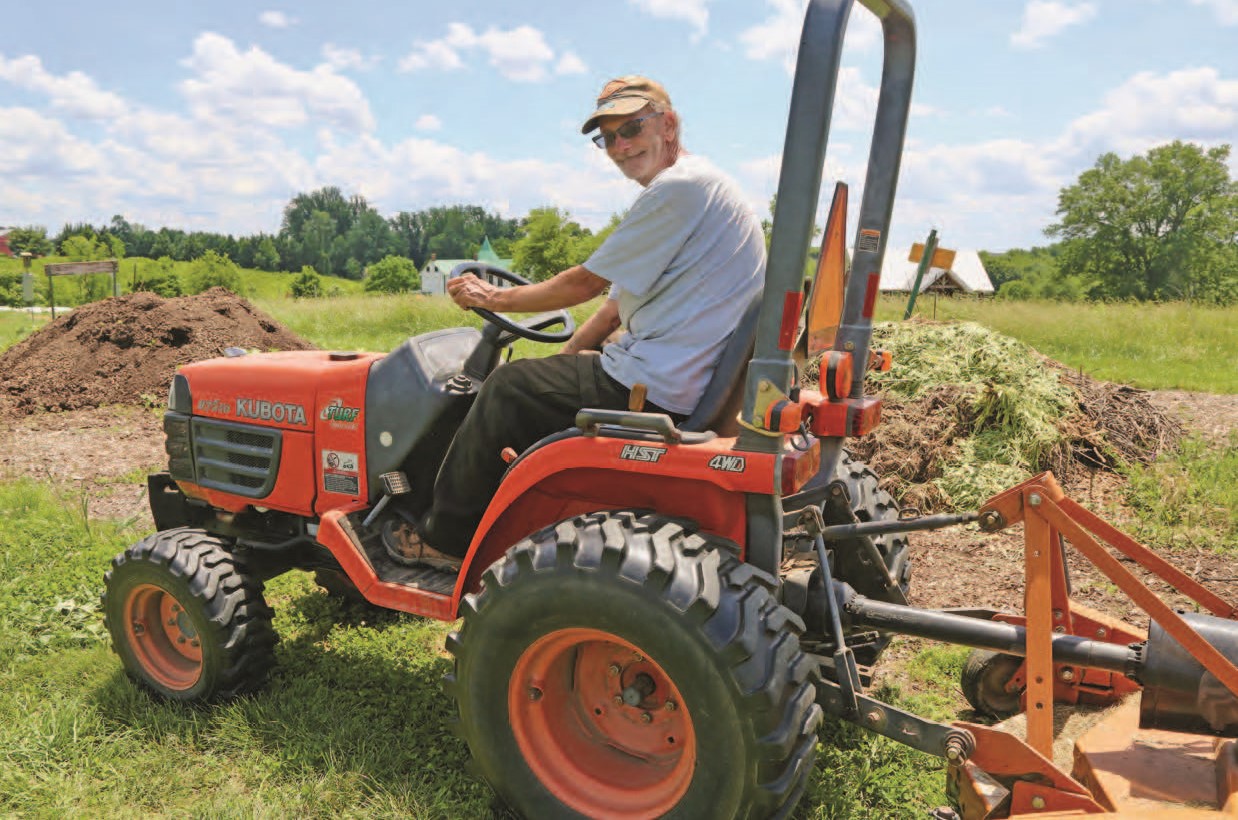As you leave the two-lane highway to enter the graveled road that leads to the 12-acre Red Wiggler farm, an eastern towhee darts across your path and the wilderness opens on your left.
Then the large red barn comes into view.
To your right lies the heartbeat of the farm, the multipurpose building where the fresh vegetables are stacked and washed. On the second floor of the building, the six-person staff works in an open-plan office space that overlooks the cultivated USDA-certified
organic vegetables, herbs and flowers that thrive in this corner of Montgomery County, Maryland.
Beyond the multipurpose building, the farm’s executive director and founder Woody Woodroof maintains a solar-operated house.
Red Wiggler is an example of community-supported agriculture or CSA—a farm supported by people in the local community who buy prepaid shares in the farm’s harvest and then receive a portion of that harvest throughout the growing season.
But Red Wiggler is much more.
More than a Farm
These growers speak at conferences, educate the public—and develop lifelong friendships.
Woodroof established Red Wiggler in 1996 to create meaningful and gainful employment for people with intellectual and developmental disabilities (IDD) who learn to grow and sell produce. The original farm was only three rented acres.
In 2003, Red Wiggler began working with the Maryland National Capital Park and Planning Commission to establish a public-private partnership on 300 acres of parkland that would create a farm four times larger than the original.
Today, the farm employs 15 adults with IDD who serve as “growers.” The term describes these adults as working farmers who are involved in every step of the crop growing and harvest. The farm also has full-time staff to help run the farm and
hundreds of volunteers who provide their time and services to advance Red Wiggler’s mission of helping people with IDD and others to come together to work, learn and grow healthy food.
Woodroof summarized the prodigious significance of the farm: “I’m proud of the people who work here and I’m proud to give them the opportunity to flourish. It’s amazing to see how the growers change over time, have an impact on
their community and work toward a common goal.”
Sustainable, Local, Inclusive
 Samantha Sheehan harvests garlic at Red Wiggler farm, an example of community-supported agriculture.
Samantha Sheehan harvests garlic at Red Wiggler farm, an example of community-supported agriculture.
Red Wiggler is devoted to environmental stewardship. It practices sustainable farming by paying careful attention to watershed and habitat protection. It also conserves resources through solar panels and driplines, reduces its carbon footprint by selling
locally, actively preserves open farmland and builds food security for its community.
Fifty percent of the farm’s total harvest is distributed to local food banks and the other 50 percent is sold through the 120-member CSA program. Red Wiggler is the longest continuously running CSA in Montgomery County, which sits just north and
west of Washington, DC.
The farm is also committed to education and inclusion, providing youth and adults with the literal tools and the experience of growing the food that ends up on their dinner plates.
The growers gain a professional identity as farmers. They engage with the community in growing and distributing organic food. In addition, the people with IDD who work at Red Wiggler enrich their lives by developing skills that assist them in building
a life far beyond the group homes where they live.
David Ruch has been with Red Wiggler for more than 15 years. He began as a grower, starting seeds in containers, transferring them to the ground and eventually harvesting them. He now leads teams of growers and volunteers. He is also passionate about
flowers and creates beautiful bouquets. And last year, Ruch began operating the farm’s tractor, a job he had long looked forward to.
Ruch encapsulates his time at the farm: “People at Red Wiggler have the same kind of disability I have and I feel safe here.”
Steve Lashmit, who began as an intern and now is employed by the farm, seeds, weeds, transplants and thins the crop. He also harvests, sorts, weighs and mulches. Lashmit loves studying insects and knows many of their names and roles in the ecosystem—a
knowledge he loves to share.
That leads to another benefit. The farm encourages the growers to interact with people on topics related to their work, which includes leading school groups on tours and explaining best practices to children. These growers speak at conferences, educate
the public—and develop lifelong friendships.
Samantha Sheehan has also been with the farm for more than 15 years. She too was hired as a grower, but now she helps new staff learn about the property. She has a broad knowledge of agricultural practices, including irrigation and cover crops. In 2019,
Sheehan was part of a team that presented Red Wiggler’s farming methods at a conference on farm-based education.
All these opportunities provided by Red Wiggler help the growers overcome traditional barriers to skilled employment. According to the U.S. Department of Labor, people with disabilities are unemployed at twice the rate of the general U.S. population.
And for some disability categories, the unemployment rate is much higher.
In short, the farm not only empowers the growers to live their best lives, it also provides an opportunity for them to supply fresh produce to the community, practice environmental stewardship and participate in the local economy.
 David Ruch and other employees operate a thriving farm in Montgomery County, Maryland.
David Ruch and other employees operate a thriving farm in Montgomery County, Maryland.Care Farming as Therapy
Care farming is a therapeutic practice used with people with IDD as well as other marginalized populations (for example, veterans and seniors). This approach provides dependable, nature-related education and employment opportunities.
Red Wiggler established the Care Farming Network (CFN) in the U.S. CFN facilitates the networking of care farms like Red Wiggler across the nation to broaden opportunities for people with IDD to experience nature, meaningful work and interaction with
the larger community.
CFN shares information and collaborates with care farms on solutions to a wide range of challenges. There are currently 175 member farms nationwide in the ever-expanding CFN, and they all use the Care Farm Directory website that Red Wiggler developed
to provide information about best practices and help troubleshoot concerns.
In 2018, in partnership with Future Harvest: A Chesapeake Alliance for Sustainable Agriculture, Red Wiggler hosted the first-ever Mid-Atlantic Care Farming Summit, which brought nearly 100 people together from seven states and Italy. Topics ranged from
establishing farms to balancing mission with production and community involvement. In a post-Summit survey, all the participants said that they would attend an annual conference and would share their best practices and resources. And in 2022, Red
Wiggler expanded outreach beyond the Mid-Atlantic region by launching the CFN web presence nationwide. It currently hosts free monthly membership gatherings that facilitate conversation and offer support to care farms and the people working on these
farms.
This year, CFN is starting a mentorship match in the northeastern U.S. that will help beginners find established care farmers willing to guide them.
How To Create And Enjoy A Care Garden
- Contact CFN to discover if gardening programs already exist in your area.
- Contact the local chapter of Master Gardeners to ask if they can help establish the garden.
- Reach out to the community for free tools, equipment and fencing for these projects.
- Work with people with IDD (typically they have a job coach with them) to plant, maintain and harvest.
- Enjoy your bounty with chapter members or host a community potluck.
Opportunities for League Chapters
If you’d like to do more to support people with IDD and help nourish your community, your chapter can help establish gardens that feed people locally and generate opportunities for people who might never have a growing and harvesting experience
otherwise.
By starting a garden, Ikes can continue to engage their communities in a new way or work with a care farm to advance its mission.
CFN is always interested in pairing aspiring care farmers with underutilized land and is hoping to provide mini-grants to help out care farms in the future. Either way, chapters can attract new people to the League and enhance activities for current
members interested in small-scale farming.
Master Gardeners are people who engage in intensive horticultural training and then volunteer in their communities in every state in the nation. They may be available, free of charge, to help a chapter determine the best location for a garden, the
soil necessary to provide the best crop, the type of food or flowers best suited to the location, and the steps necessary to provide years of harvest.
League chapters can create a local blueprint for a garden of inclusion that may increase membership and community goodwill. Ikes can also share the concept of care farming with schoolchildren who come to tour while giving people with IDD the chance
to enjoy the great outdoors.
All chapters have the potential to be involved in the commitment to bring nature to all sectors of the public. Like the League, Red Wiggler develops a community spirit and improves the world—one person at a time. The farm continues to evolve
and discover new ways of supporting marginalized members of the community, and Ikes can too.
We the people have the power to share the joy and bounty of nature with everyone in the community.
Top photo: Harvesting cherry tomatoes that will be sold locally. Credit: Woody Woodroof.